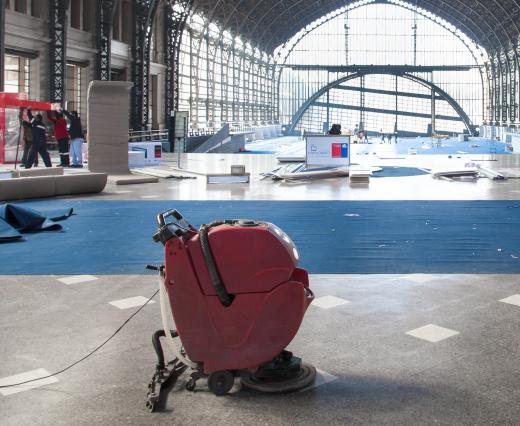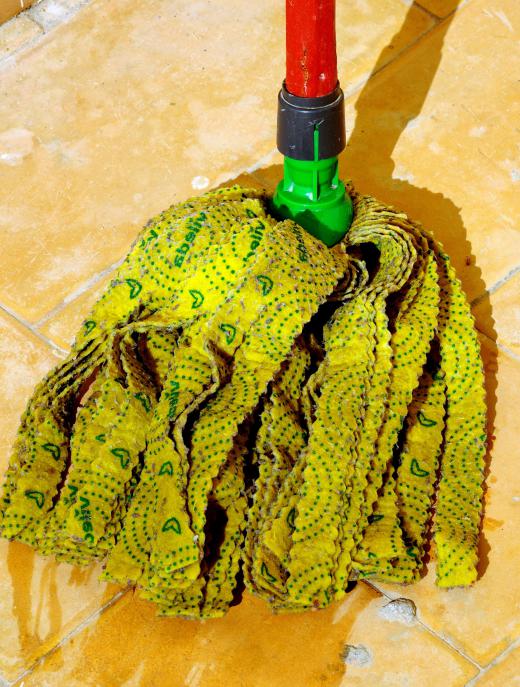There was a time when scrubbing floors required plenty of water, soap, and a strong back; the only way to really scrub a floor effectively was to get down on hands and knees and slowly work across the entire floor. Fortunately, the floor scrubber, also referred to as a mop, was invented and took a lot of the labor out of cleaning the floors. As a tool that is used daily in all sorts of public buildings, a mop is a great way to take care of an essential job in a fraction of the time it would take to do the work on hands and knees. Some examples of different types of floor scrubbers include automatic floor scrubbers, floor buffers, and floor polishers; these tools are made of a variety of materials such as brushes and sponge pads, and are typically used with a liquid floor-cleaning agent.
Automatic Floor Scrubbers

Although basic floor scrubbers, such as cloth mops, made their appearance in the 1920s, automatic floor scrubbers were not invented until the middle of the 20th century. With a basic design that was somewhat like a push lawn mower, these early models of the automatic floor scrubber contained a well for water and soap, as well as jets that could squirt the cleaning mixture onto the floor. A set of rotary brushes worked the cleansers into the facing of the floor, effectively lifting dirt and scrubbing the floors clean.

Since the modern floor scrubber tended to leave less water behind than cleaning floors by hand, the floor scrubber improved the process in several ways: first, it is not longer necessary to get down on hands and knees to scrub the floor, the job can be done in much less time, and the floor should dry quicker, meaning less waiting time to resume normal activities.
Floor Buffers

As the use of floor scrubbers expanded from corporate buildings to schools and municipal buildings, there began to be some variations on the device. Floor buffers were invented for use on linoleum and similar floor coverings. In addition to cleaning the floors, the automated floor buffer also buffs the surface of the floor to attain the highest degree of shine. Floor buffers often use rotary brushes like those of the floor scrubber, but they are typically made of a softer material to avoid causing any damage. Once the floor is buffed to a nice level of shine, it may look even cleaner than it would have otherwise.
Floor Polishers

For marble and wood floors, a floor polisher is often the tool of choice. Floor polishers tend to work best on natural materials that have not been treated with harsh chemicals. Thoroughly cleaning the floor before applying polish will most likely render the best results. It is possible to buy floor polish at most major hardwood stores; the type of polish will vary depending on the type of flooring. Most polishes not only make the floor shine, but add a protective coating as well. To avoid having to apply the polish by hand, automatic floor polishers can also be bought or rented at many hardware or home improvement stores.
The All-in-one Tool
Over the years, the lines have blurred among the varying types of floor scrubbers. Innovations in the design and function of the floor scrubber have made it possible to use one machine for just about any type of flooring, from cement to natural wood to synthetic floor tiles. In recent years, smaller models designed for home use have joined the market, allowing homeowners to scrub, buff, and shine their domestic floors with the same level of expertise formally found only with professional cleaning crews. Whether the idea is to clean up a messy floor or bring out the natural sheen of the material, a good quality floor scrubber can make the job easier.

